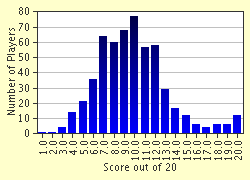Quiz Answer Key and Fun Facts
1. This Irish writer worked many years as business manager at London's Lyceum Theatre.
2. On his death bed, he asked his lifelong friend, Max Brod, to burn all his unpublished manuscripts, but luckily Brod ignored the request.
3. Descendant from a prominent Puritan family and son of a sea captain, he served as a surveyor of the port at Salem. During that time, he started writing his masterpiece.
4. A famous legend states that when his son hauled him into court in order to declare him mentally incapable, this dramatist (aged 90) defended himself by reciting lines from a tragedy he was composing at the time.
5. At age 12, he worked for several months at a blacking factory, while his father was in Marshalsea debtor's prison.
6. A few months before his death he married a Polish Countess, with whom he had corresponded for 18 years.
7. This Scottish author studied at the Royal Infirmary in Edinburgh, and received a medical degree in 1881.
8. This writer spent some years in Ghana, and worked there as feature editor for "The African Review".
9. This Latin American author changed his name so that his family wouldn't discover his literary activity.
10. "Every pig is entitled to a happy pig life": with an open letter to the Prime Minister and other initiatives, this Scandinavian author influenced a new animal protection law.
11. After fighting at the naval battle of Lepanto against the Turks, on his way back home, this Spanish writer was captured by Algerian pirates and was slave in Algiers for five years.
12. He was killed at age 29 during a drunken fight in a tavern, under mysterious circumstances.
13. She conceived an "amour fou", a crazy, all-consuming love for Frédéric Chopin.
14. He deserted his military post in Stuttgart and, after great financial difficulties, worked under an assumed name as a dramatist for the Mannheim Theatre.
15. This English author travelled to Spain to report on the civil war, and while fighting alongside the Marxist P.O.U.M. Militia, received a near fatal wound in the neck.
16. In Naples he met the woman whom he was to immortalise in his literary work as Fiammetta.
17. He was sentenced to four years of hard labour in a Siberian penal camp. During that disastrous time, he suffered frequent attacks of epilepsy.
18. She worked as a reporter for the "Atlanta Journal Sunday Magazine".
19. He was banished from Rome by emperor Augustus because of an unexplained "act of folly".
20. This German novelist lived partly in Cologne and partly on Achill Island, off the Irish west coast. His cottage in Ireland is now a museum.
Source: Author
Arlesienne
This quiz was reviewed by FunTrivia editor
Exit10 before going online.
Any errors found in FunTrivia content are routinely corrected through our feedback system.


